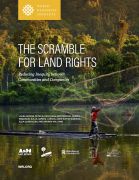The scramble for land rights: reducing inequity between communities and companies
The scramble for land rights: reducing inequity between communities and companies

Increasing global demand for natural resources is intensifying competition for land across the developing world, pushing companies onto territories that many Indigenous Peoples and rural communities have sustainably managed for generations. These communities, who collectively hold at least half the world’s land but legally own just 10 percent of land globally, are now racing to protect their land rights. A comprehensive global review of how communities and companies formalize land rights, this report examines discrepancies in time and costs required to obtain formal land rights as well as the land size and rights ultimately granted to each in 15 countries across Africa, Asia and Latin America. It uncovers significant differences in the barriers that both groups face – disparities that give companies a clear advantage. Communities sacrifice years or even decades navigating unwieldy, expensive government processes that may force them to give up significant portions of their ancestral lands, while wealthy companies with strong political connections quickly secure rights to the same land. The report sheds light on this uneven playing field between companies and communities, and recommends a more transparent path forward. It calls on countries to simplify overly complex procedures and amend steps that impose difficult, undue burdens on communities, while uniformly enforcing corporate land acquisition policies. Around the world, better conflict resolution mechanisms are needed to address competing third-party claims, and governments must also protect communities' right to free, prior and informed consent.







